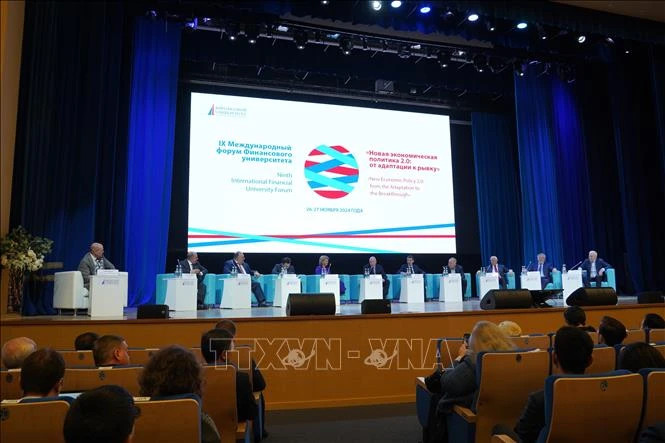At the 9th International Forum with the theme "New Economic Policy 2.0: From Adaptation to Breakthrough", Russia and its partners exchanged development experiences in a friendly cooperation space, which has helped the Russian economy stand firm in difficult times.
The forum brought together more than 4,500 delegates from the financial, business and scientific communities from 20 countries, discussing current issues of the global economy and Russia's current socio-economic policy.
With the fluctuating world situation and the Russian economy under great pressure from Western sanctions, Russia's reality shows a successful lesson in self-reliance for development.
The import substitution programme has achieved positive results, reducing dependence on imported products and increasing economic autonomy.
Russia's economic growth is forecast to reach 4% in 2024, showing that the Russian economy is on the path of positive recovery. The orientation of high-tech development is affirmed by Russia's approval of the budget for the coming years, creating a solid foundation for the future. In addition, resources from businesses also contribute significantly to the growth of the economy.
At the Forum, Russian Finance Minister Anton Siluanov affirmed that Russia will not continuously implement support and stimulus policies because this will lead to banks increasing interest rates.
In the next 3 years, Russia will pursue a balanced budget policy and continue to invest in key areas, including high technology and areas that ensure national development goals.
One of the important achievements that has contributed significantly to the Russian economy is the strong development of the agricultural sector. In recent years, under pressure from Western sanctions, Russia has promoted import substitution policies and achieved breakthrough developments in this field.
According to Russian Central Bank Governor Elvira Nabiullina, Russia's financial stability will not be affected even if the West confiscates Russia's frozen assets. The Central Bank has diversified its foreign exchange reserves over the years and is implementing reserves unaffected by sanctions.
One of the important achievements that has contributed significantly to the Russian economy is the strong development of the agricultural sector. In recent years, under pressure from Western sanctions, Russia has promoted its import substitution policy and achieved breakthrough developments in this field.
From an importing country, Russia has become one of the world's leading agricultural exporters, ranking 17th in the list of leading exporters, of which Russia is the world leader in exporting wheat, beans, barley, linseed oil and frozen fish.
According to Russian Deputy Prime Minister Dmitry Patrushev, in 2024, Russia will not only fully meet domestic demand but also maintain its position as a reliable food supplier on the world market, actively participate in international humanitarian programs, and contribute to ensuring global food security.
Russia's agricultural supply to foreign markets continues to grow. In the 2023-2024 agricultural season, for the first time in history, Russia accounted for more than 25% of the world's wheat exports.
The positive results of the Russian agricultural sector are largely due to the policy of creating favourable conditions for farmers and partners in related industries. In addition, the production of raw materials necessary for domestic demand also contributes to the dynamic development of Russian agricultural exports.
Russian President Vladimir Putin announced that Russia has set a goal to enter the top four largest economies in the world.
According to a newly published report by the International Monetary Fund (IMF), Russia's GDP in 2024 is expected to account for 3.55% of the world's total GDP in terms of purchasing power parity. Thereby, Russia surpassed Japan (3.38%), taking fourth place in the ranking.
Expanding international cooperation with countries with friendly relations is an orientation that Russia has strongly developed. As the global economy enters an era of fundamental changes in a multipolar world and new growth centres, Russia continues to be proactive, turning challenges into opportunities for stability and strong development.
















